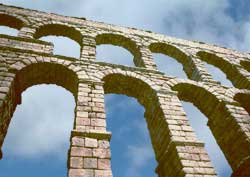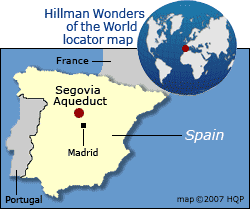Segovia Aqueduct
 Why the
Segovia Aqueduct
is special
Why the
Segovia Aqueduct
is specialThe Segovia Aqueduct was built by the Romans nearly 2,000 years ago and is in remarkable condition considering its age. It is one of the greatest engineering feats of the ancient world.
Segovia Aqueduct tips & insights
Construction
The Romans used no mortar, metal clamps, or other devices. Only gravity holds the 20,000-plus chiseled granite stone blocks together.
Purpose
The Segovia Aqueduct conveyed water to the town from the mountains 17 kilometers (11 miles) away.
Arches
The last portion of the aqueduct (nearly 1 kilometer or a half-mile in length) is elevated to pass over a terrain depression and part of the town. It comprises both single and double-tiered arches. The latter (see photo) needs to be piggybacked for strength because it soars as high as a modern 9-story building. All told, there are 119 arches.
Still functioning
Amazingly, the Segovia Aqueduct is still capable of conveying water today. However, some experts are deeply concerned about the negative effects of pollution and other modern day plights on the structure.
Seqovia
The town is only an hour's drive from Madrid, making this town a well-traveled daytrip. Its other attractions include the Segovia Alcazar and the cathedral. The first is a Hillman Wonders bronze medal winner, the second is a close runner-up.
Location in Spain



